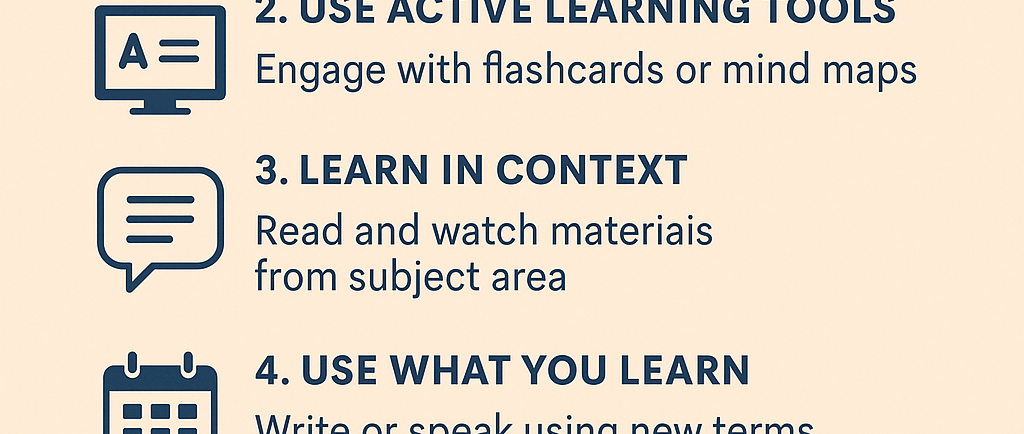How to Build Vocabulary to Master a Subject


Building vocabulary is one of the most powerful steps you can take to gain mastery over any subject—whether it’s medicine, marketing, mathematics, or music. A strong subject-specific vocabulary helps you understand key concepts more deeply, think more precisely, and communicate more clearly. Here’s a structured guide to building vocabulary effectively as you study any topic.
⸻
1. Start with Core Concepts
Begin by identifying the most essential terms in the subject. These are the foundational words that appear frequently in books, lectures, and discussions.
How to Find Them:
• Skim the glossary of a textbook or online guide.
• Search for “essential terms in [subject]” online.
• Look at chapter titles and subheadings in study materials.
Write these terms down with short definitions in your own words. Understanding the basics is your launchpad for deeper learning.
⸻
2. Use Active Learning Tools
Instead of passively reading, engage with vocabulary actively.
Try:
• Flashcards: Tools like Anki or Quizlet help you review regularly using spaced repetition.
• Mind maps: Visualize how new terms relate to each other and to what you already know.
• Practice sentences: Use new terms in your own examples to reinforce meaning and context.
⸻
3. Learn in Context
Memorizing definitions is helpful, but learning how vocabulary functions in real use is even more powerful.
Strategies:
• Read articles, books, or papers in your subject. Highlight new terms.
• Watch educational videos or listen to podcasts related to your topic.
• Take notes: When you see a word used, note how it fits into the bigger idea being explained.
Context helps anchor meaning and reduces the chance of forgetting.
⸻
4. Use What You Learn
To truly internalize vocabulary, you must use it. The more you apply terms correctly, the more confident and fluent you become.
Ways to Apply:
• Teach someone else: Try explaining the term and concept out loud.
• Write summaries or essays: Use the vocabulary to express what you’ve learned.
• Join online forums or study groups: Use your growing vocabulary in conversations.
⸻
5. Review Regularly
New vocabulary fades fast unless you revisit it. Set a review schedule:
• Daily for new terms
• Weekly for previously reviewed words
• Monthly for reinforcement
Spaced repetition is key to long-term retention.
⸻
6. Connect New Words to What You Know
Try building associations or stories around terms. For example:
• Etymology: Understanding roots, prefixes, and suffixes can help you guess meanings and remember terms more easily (e.g., “bio” = life, “logy” = study of → “biology”).
• Personal examples: Tie terms to experiences or analogies that make sense to you.
⸻
7. Stay Consistent
Building vocabulary takes time, but with steady effort, the results compound. Set small goals like learning five new words a day and tracking your progress.
⸻
Final Thoughts
Mastering vocabulary isn’t just about learning new words—it’s about unlocking the language of a subject. Once you can think and speak in the terms of your field, comprehension, problem-solving, and communication become far more effective. Vocabulary is the bridge between knowledge and understanding—build it well, and every subject becomes more accessible.
